|
|
|
Sort Order |
|
|
|
Items / Page
|
|
|
|
|
|
|
| Srl | Item |
| 1 |
ID:
133116


|
|
|
|
|
| Publication |
2014.
|
| Summary/Abstract |
This paper draws from research on small-scale maize production in Mexico's Central Highland region to discuss the geopolitical implications of everyday agricultural practices. An overwhelming majority of maize farmers in this region, as well as in the country more broadly, continue to cultivate locally adapted maize varieties they have bred themselves - criollo maize is the vernacular term - despite decades of concerted government attempts to effect the widespread adoption of commercially bred and licensed hybrid varieties. This state effort to restructure agricultural systems and food security according to nationalist and capitalist priorities is one tactic in a long and violent struggle for control over peasant land and labour in Mexico. By integrating feminist scholarship in geopolitics and in political ecology, I am following the lead of geographers who regard the materialities of everyday life as a foundation for political tensions and conflicts that are constantly unfolding along intersecting lines of difference. Though geopolitics has rarely turned its attention directly to theories of intimate socio-ecological relations, I argue that the field has much analytical and political leverage to gain by engaging with political ecology, and that feminist geographic imaginaries provide a crucial space in which to do so. This approach allows for an analysis of how a dominant geopolitics of land and agriculture is being undermined through the routine production of criollo maize, revealing new potential for creating broad political alliances with social movements that are currently working toward alternative visions of agriculture and food security.
|
|
|
|
|
|
|
|
|
|
|
|
|
|
|
|
| 2 |
ID:
133109
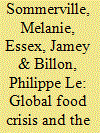

|
|
|
|
|
| Publication |
2014.
|
| Summary/Abstract |
Growing anxieties over food security have recently brought sharp geopolitical overtones to debates about the agro-food sector. Contending that this 'geopolitical moment' highlights the mutually constitutive nature of geopolitics and political economies of food, we examine how dominant geopolitical framings of food security extend and deepen neoliberal models of agro-food provisioning, and highlight the need for further attention to these dynamics from political geographers. We develop a preliminary research agenda for further work in the field, focusing on the recent spate of global farmland acquisitions, questions of agro-food governance, the securitisation of hunger and obesity, and the environmental impacts of dominant agro-food systems. Throughout, we highlight the value of a counter-geopolitics of food security for re-situating agro-food politics outside hegemonic policies and institutions, and of the alter-geopolitics of food pursued by communities embodying concrete alternative food production and consumption systems.
|
|
|
|
|
|
|
|
|
|
|
|
|
|
|
|
| 3 |
ID:
133117


|
|
|
|
|
| Publication |
2014.
|
| Summary/Abstract |
The dramatic expansion of large-scale economic land concessions and acquisitions in the Global South has generated considerable concern amongst activists, journalists and academics recently. This has led to the increased prevalence of the term 'global land grabbing', which I argue represents a particular type of meta-narrative. In this article the global land grab meta-narrative is considered in relation to recent land alienation of Indigenous Peoples in the northeastern Cambodia province of Ratanakiri. While land grabbing is certainly a crucial problem, it is insufficient to explain the circumstances in Ratanakiri or in Cambodia more generally as 'global land grabbing'. While foreign capital is associated with land grabbing in Cambodia, there are various other factors that also require consideration. Specifically, the role of Asian money laundering and elite capture requires increased attention. This article contributes to better understanding the particular ways that land dispossession plays out in particular places and contexts.
|
|
|
|
|
|
|
|
|
|
|
|
|
|
|
|
| 4 |
ID:
133108
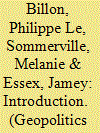

|
|
|
|
|
| Publication |
2014.
|
| Summary/Abstract |
This special issue of Geopolitics focuses on recent shifts in the geopolitics of agro-food systems linked to debates around a new 'Global Food Crisis' and its implications for (trans)national political agendas. Spurred since 2006 by rising food prices, large-scale farmland acquisitions, and growing public protests, these concerns have motivated new streams of development assistance and reforms to global governance processes, as well as strengthened activism by agrarian social movements. While governments and civil society organisations have struggled with how best to address the realities of worsening food insecurity, the discourse of crisis has simultaneously helped to actively reposition food security as an object of urgent geopolitical calculation and strategy. The stubborn grip of continuing poverty and hunger has prompted many observers to envision a future in which chronic food insecurity and associated political and economic disorder are the new normal.
|
|
|
|
|
|
|
|
|
|
|
|
|
|
|
|
| 5 |
ID:
090767
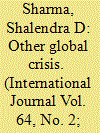

|
|
|
|
|
| Publication |
2009.
|
| Summary/Abstract |
Like the financial crisis, the severity of the food crisis caught gobernments around the world by surprise. This confusion and unpreparedness was vividly reflected by the former leader of the world's richest and most powerful nation, US President George W. Bush, whose initial reaction was to blame developing countries implicitly for the crisis by noting that when poor countries like India and China prosper, they start demanding better nutrition and better food and when demand is high, that causes the pricess to go up.
|
|
|
|
|
|
|
|
|
|
|
|
|
|
|
|
| 6 |
ID:
133112
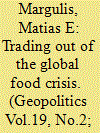

|
|
|
|
|
| Publication |
2014.
|
| Summary/Abstract |
The geopolitics of the Global Food Crisis and international trade has received limited scholarly attention, a significant omission given the major roles of the World Trade Organization (WTO) in structuring world food production and trade flows and as a principal inter-state governing mechanism of the global agro-food system. Analysing recent international policy actions framing the WTO as a 'fix' to the Global Food Crisis, this article points to the value of a critical geopolitics of agro-power sensitive to the spatial reconfiguration of production and power in the global agro-food system, problematising geospatial categories such as 'North' and 'South', and that takes seriously contests for control of geopolitical agents such as the WTO.
|
|
|
|
|
|
|
|
|
|
|
|
|
|
|
|
| 7 |
ID:
133113
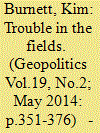

|
|
|
|
|
| Publication |
2014.
|
| Summary/Abstract |
Crisis can create opportunity for change. The 2007-2008 food price crisis has demonstrated that the existing structures of agricultural production and trade lend to food price volatility and renders many of the poorest people around the world vulnerable to food insecurity. Two movements that have raised such contentions over the years are the Fair Trade and Food Sovereignty movements, though in very different ways. My research examines the food crisis and its root causes, and the global governance mechanisms that have emerged in response. It then investigates and analyses whether and how these movements have responded to these new opportunities. The paper argues that engagement by both social movements is crucial to ensuring that the interests of those they represent are considered in the shaping of future governance of global food and agriculture.
|
|
|
|
|
|
|
|
|
|
|
|
|
|
|
|
|
|
|
|
|